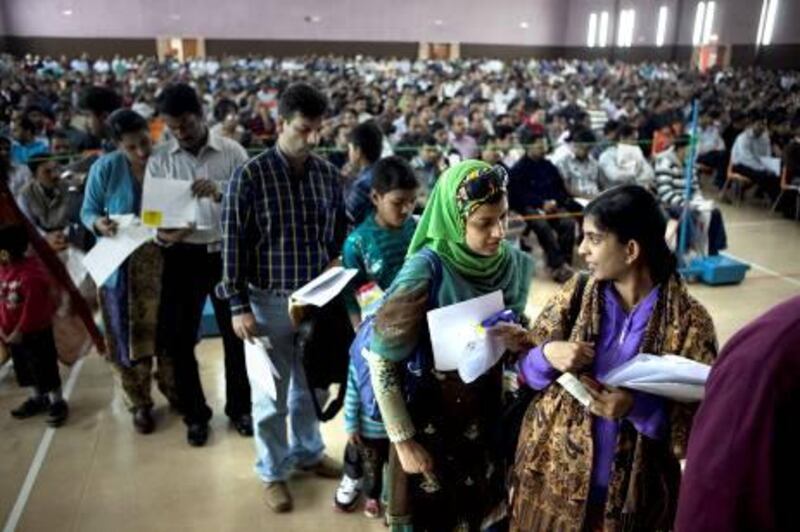ABU DHABI // Santhya Sabu could not understand why her friends advised her to secure school places for her children before settling in when she arrived in the capital a few months ago.
She understands now.
Yesterday, Ms Sabu joined the parents of about 3,000 children in the auditorium of the Abu Dhabi Indian School (Adis) at 7.45am for a lottery to decide who would receive the 200 available seats.
"My children's education depends on luck in this country and we were not lucky," she said, disheartened at the result of the draw. "Now I need to find another school in the same budget. I don't know if there is one."
The huge turnout to occupy so few spaces for the academic year that starts in April spells out one of the biggest education problems in the capital: a lack of places at quality Indian schools on the island.
Principals said this year was particularly difficult as schools struggled to meet new Abu Dhabi Education Council (Adec) guidelines on safety.
The education council's warning to villa schools to restrict pupil numbers and prepare for closure by next year has added to the strain, with many parents in the capital scrambling to find schools.
Adis is among a handful of Indian schools that opened registration, inciting a frenzy among parents.
School officials began yesterday's event by laying down the rules as 900 applicants filed into the hall to witness the draw for 90 kindergarten seats.
"Latecomers will not be entertained," said VK Mathu, the chief executive of the school. "If you do not respond when your number is called, I am sorry, you have missed the chance."
As Mr Mathu unlocked the token box, there was applause followed by anxious whispers and silent prayers.
"Unfortunately, due to a space constraint here we are not in a position to accommodate all your children," said NC Vijayachandra, the principal. "So today, let the luck be equally distributed."
Girish Walvekar's son was the first to secure a kindergarten seat. Mr Walvekar immediately called his wife to share the news.
"I was shivering when they called out my number," he said as he completed paperwork and submitted the fee to protect his child's place. "I have never been lucky in a lottery but this is my son's good fortune. This is much bigger than any lottery."
Mr Walvekar said it would have been a challenge to find alternatives had his son not been chosen.
"I would have to move to Musaffah where there are a few options, but that would be undesirable because I work in the city," he said.
While Mr Walvekar celebrated, others walked out feeling disgruntled and planning their next step. Many have decided to send their families back home.
Sameera Saharban, a parent with two young children, said she felt "clueless".
"We will try to talk to the principal and see if he can help us out," Ms Saharban said. "Right now I cannot see an option. I tried at other schools and there was no space. But I won't give up just yet."
Rajeev PV, the parent of a Grade 3 pupil, said the problem was a lack of interest in opening affordable schools.
"Education is a business here," Mr Rajeev said. "Opening up Indian schools would mean providers would not make as much profit as they would in an international school, so they avoid it."
His daughter is studying at a villa school but the uncertainty worries him: "We know it will close eventually and then we will be desperate for a school.
"If the situation is so bad now, then once they close it will be worse. So we want to try and get her here as soon as possible."
Nadia Sheik, whose daughter is aged 4, has decided to keep her child home for a year.
"There are waiting lists at other schools so it does not seem possible to educate in a school this year," Ms Sheik said.
Gems, the largest education provider in the country, said it had 2,000 pupils on waiting lists at its Indian schools in Abu Dhabi and Dubai.
Muhsin K, the head of the Indian Islahi Islamic School, said it was also full and had not opened registration for lower grades this year.
Parents said Adec should intervene and offer incentives to education providers to open more schools.
"They should give land to build schools and ease certain regulations", at least while the shortage exists, said one parent.
Last week Adec said at least four Indian schools were due to open next year, adding 10,000 seats, while two schools had permission to offer at least 400 additional seats for the next academic year.






